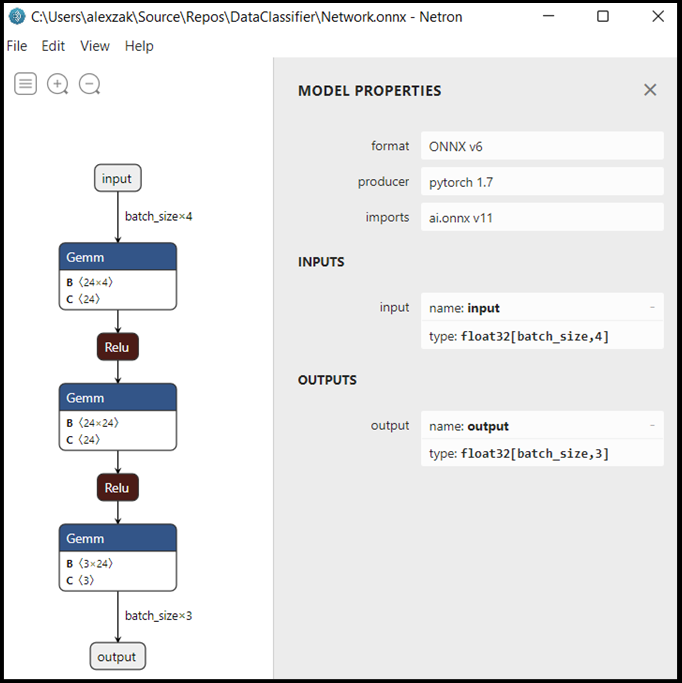將 PyTorch 模型轉換為 ONNX 格式
在本教學課程 的上一個階段中,我們使用 PyTorch 來建立機器學習模型。 不過,該模型是檔案 .pth 。 若要能夠將其與 Windows ML 應用程式整合,您必須將模型轉換成 ONNX 格式。
匯出模型
若要匯出模型,您將使用 函式 torch.onnx.export() 。 此函式會執行模型,並記錄用來計算輸出的運算子追蹤。
- 將下列程式碼
DataClassifier.py複製到 Visual Studio 中的檔案,位於您的 main 函式上方。
#Function to Convert to ONNX
def convert():
# set the model to inference mode
model.eval()
# Let's create a dummy input tensor
dummy_input = torch.randn(1, 3, 32, 32, requires_grad=True)
# Export the model
torch.onnx.export(model, # model being run
dummy_input, # model input (or a tuple for multiple inputs)
"Network.onnx", # where to save the model
export_params=True, # store the trained parameter weights inside the model file
opset_version=11, # the ONNX version to export the model to
do_constant_folding=True, # whether to execute constant folding for optimization
input_names = ['input'], # the model's input names
output_names = ['output'], # the model's output names
dynamic_axes={'input' : {0 : 'batch_size'}, # variable length axes
'output' : {0 : 'batch_size'}})
print(" ")
print('Model has been converted to ONNX')
請務必在匯出模型之前呼叫 model.eval() 或 model.train(False) ,因為這會將模型設定為 推斷模式 。 這是必要的,因為運算子類似 dropout 或 batchnorm 的行為在推斷和定型模式上不同。
- 若要執行對 ONNX 的轉換,請將對轉換函式的呼叫新增至 main 函式。 您不需要再次定型模型,因此我們會將不再需要執行的一些函式批註化。 您的主要函式如下所示。
if __name__ == "__main__":
num_epochs = 10
train(num_epochs)
print('Finished Training\n')
test()
test_species()
convert()
- 選取
Start Debugging工具列上的按鈕或按 ,再次執行F5專案。 不需要再次定型模型,只要從專案資料夾載入現有的模型即可。
流覽至您的專案位置,並尋找模型旁邊的 .pth ONNX 模型。
注意
有興趣深入了解嗎? 檢閱 匯出 mdoel 的 PyTorch 教學課程。
探索您的模型。
Network.onnx使用 Neutron 開啟模型檔案。選取資料 節點以開啟模型屬性。

如您所見,模型需要 32 位張量(多維度陣列)float 物件做為輸入,並傳回 Tensor 浮點數做為輸出。 輸出陣列會包含每個標籤的機率。 您建置模型的方式,標籤會以 3 個數字表示,每個數位都與特定類型的鳶尾花相關聯。
| 標籤 1 | 標籤 2 | 標籤 3 |
|---|---|---|
| 0 | 1 | 2 |
| 鳶尾花 | Iris-versicolor | 鳶尾花 |
您必須擷取這些值,才能使用 Windows ML 應用程式顯示正確的預測。
後續步驟
我們的模型已準備好部署。 接下來,針對主要事件 - 讓我們 建置 Windows 應用程式,並在您的 Windows 裝置 本機執行。